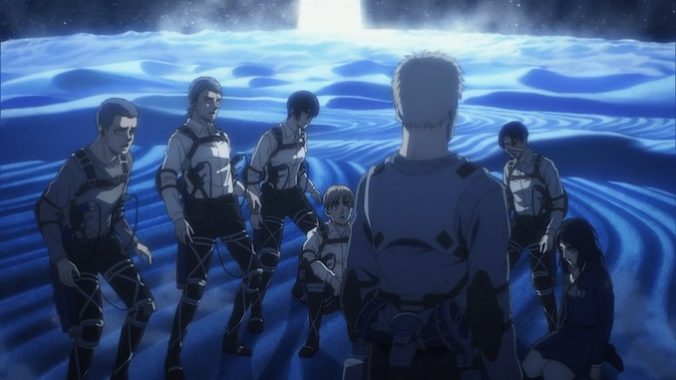Attack on Titan: The Final Season Cannot Rewrite the Manga’s Controversial Ending
Photo Courtesy of Crunchyroll
Rumors that the first part of the last part of the final season of the insanely popular anime Attack on Titan would be delivered in the form of an hour-long special were correct. The special, which premiered on Japan’s NHK television network this past weekend, follows the remaining members of the Survey Corps as they try to come up with a plan to stop series protagonist-turned-antagonist Eren Yeager from destroying the world.
Commercially and culturally, Attack on Titan has never been more successful or relevant, with the current hype around the show rivaling and perhaps even surpassing that of its explosive debut in 2013. Critically, however, the anime stands poised to follow its manga counterpart into befuddlement and controversy as its apocalyptic final act approaches. While a part of the fanbase had convinced itself that animation studio MAPPA was going to craft a different, better ending, the special—a faithful adaptation of chapters 130-134 with minor cosmetic changes—suggests that Attack on Titan will stick to the course charted by its creator, Hajime Isayama.
Attack on Titan has come a long way since 2013. What began as a seemingly straightforward and predictable story full of shōnen clichés—screaming boys, action-figure powerups, shoehorned romance—proved to be much more surprising and substantial than anyone could have expected. This not only goes for the plot twists (some of the greatest ever, in my opinion), but the world-building, too. The Bavarian setting, which at first appeared to be little more than window dressing, jumped to the foreground when, midway through its run, Attack on Titan evolved from a disturbing fantasy about naked, man-eating giants into an even more disturbing commentary on the Second World War, told from the perspective of Imperial Japan and dealing with real-world implications of nationalism, imperialism, and racial genocide.
Ironically the moment Attack on Titan became more than just another manga or anime is also the moment it became controversial. When news broke that Isayama may have used a private Twitter account to deny the Nanjing Massacre of 1937, in which Imperial Japanese soldiers raped and killed between 200,000 and 300,000 Chinese citizens, people started searching his work for suspicious political subtext. Their findings range from the obvious yet superficial (like Mikasa being named after a warship from the Russo-Japanese War or Dot Pixis resembling an Imperial general named Akiyama Yoshifuru) to the highly analytical; in an article that was published by Polygon in 2021, translator Kazuma Hashimoto —who combed through 300+ entries of Isayama’s personal blog—argued Attack on Titan was itself an argument for the remilitarization of Japan, which, like the society in which Eren grows up, exists in a self-imposed state of pacifism.

In the manga, and now in the anime as well, Eren wants to bring that pacifism to an end. After obtaining the story-equivalent of a nuclear arsenal, he makes a conscious decision to wipe out every nation on the planet except his own. Believing that fighting for freedom and self-preservation is the whole point of being alive, and that different cultures can never coexist in peace, he convinces himself that mass murder is the only way forward.